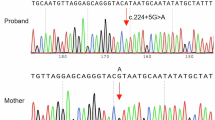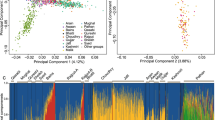Abstract
Primary microcephaly is genetically heterogeneous, with most cases showing autosomal recessive inheritance. We designed a panel containing 46 primary microcephaly-causing genes and performed mutation screening in 23 Pakistani families with autosomal recessive primary microcephaly. We found mutations that were pathogenic or likely to be pathogenic in 22 families, including 18 families with known mutations in ASPM, three with novel mutations in WDR62 and one with a novel in-frame deletion mutation in CASC5. Affected individuals harbored the c.3978G>A (p.W1326*) ASPM mutation in 15 families (nine consanguineous and six non-consanguineous), suggesting a high carrier rate of the nonsense mutation in Pakistani individuals. We identified three novel homozygous WDR62 mutations, including an intragenic deletion of 10 299 bp, a splicing mutation and a nonsense mutation. Our results confirm that mutations in ASPM or WDR62 are the major cause of autosomal recessive primary microcephaly in the Pakistani population.
Similar content being viewed by others
Log in or create a free account to read this content
Gain free access to this article, as well as selected content from this journal and more on nature.com
or
References
Morris-Rosendahl, D. J. & Kaindl, A. M. What next-generation sequencing (NGS) technology has enabled us to learn about primary autosomal recessive microcephaly (MCPH). Mol. Cell. Probes 29, 271–281 (2015).
Finlay, B. L. & Darlington, R. B. Linked regularities in the development and evolution of mammalian brains. Science 268, 1578–1584 (1995).
Kaindl, A. M., Passemard, S., Kumar, P., Kraemer, N., Issa, L., Zwirner, A. et al. Many roads lead to primary autosomal recessive microcephaly. Prog. Neurobiol. 90, 363–383 (2010).
Kloepfe, H. W., Platou, R. V. & Hansche, W. J. Manifestations of a recessive gene for microcephaly in a population isolate. J. Genet. Hum. 13, 52–59 (1964).
Thornton, G. K. & Woods, C. G. Primary microcephaly: do all roads lead to Rome? Trends. Genet. 25, 501–510 (2009).
Faheem, M., Naseer, M. I., Rasool, M., Chaudhary, A. G., Kumosani, T. A., Ilyas, A. M. et al. Molecular genetics of human primary microcephaly: an overview. BMC. Med. Genomics 8 (Suppl 1), S4 (2015).
Jackson, A. P., Eastwood, H., Bell, S. M., Adu, J., Toomes, C., Carr, I. M. et al. Identification of microcephalin, a protein implicated in determining the size of the human brain. Am. J. Hum. Genet. 71, 136–142 (2002).
Bilguvar, K., Ozturk, A. K., Louvi, A., Kwan, K. Y., Choi, M., Tatli, B. et al. Whole-exome sequencing identifies recessive WDR62mutations in severe brain malformations. Nature 467, 207–210 (2010).
Bond, J., Roberts, E., Springell, K., Lizarraga, S., Scott, S., Higgins, J. et al. A centrosomal mechanism involving CDK5RAP2 and CENPJ controls brain size. Nature. Genet. 37, 353–355 (2005).
Genin, A., Desir, J., Lambert, N., Biervliet, M., Van Der Aa, N., Pierquin, G. et al. Kinetochore KMN network gene CASC5 mutated in primary microcephaly. Hum. Mol. Genet. 21, 5306–5317 (2012).
Bond, J., Roberts, E., Mochida, G. H., Hampshire, D. J., Scott, S., Askham, J. M. et al. ASPM is a major determinant of cerebral cortical size. Nature. Genet. 32, 316–320 (2002).
Kumar, A., Girimaji, S. C., Duvvari, M. R. & Blanton, S. H. Mutations in STIL, encoding a pericentriolar and centrosomal protein, cause primary microcephaly. Am. J. Hum. Genet. 84, 286–290 (2009).
Hussain, M. S., Baig, S. M., Neumann, S., Nurnberg, G., Farooq, M., Ahmad, I. et al. A truncating mutation of CEP135 causes primary microcephaly and disturbed centrosomal function. Am. J. Hum. Genet. 90, 871–878 (2012).
Guernsey, D. L., Jiang, H., Hussin, J., Arnold, M., Bouyakdan, K., Perry, S. et al. Mutations in centrosomal protein CEP152 in primary microcephaly families linked to MCPH4. Am. J. Hum. Genet. 87, 40–51 (2010).
Yang, Y. J., Baltus, A. E., Mathew, R. S., Murphy, E. A., Evrony, G. D., Gonzalez, D. M. et al. Microcephaly gene links trithorax and REST/NRSF to control neural stem cell proliferation and differentiation. Cell 151, 1097–1112 (2012).
Awad, S., Al-Dosari, M. S., Al-Yacoub, N., Colak, D., Salih, M. A., Alkuraya, F. S. et al. Mutation in PHC1 implicates chromatin remodeling in primary microcephaly pathogenesis. Hum. Mol. Genet. 22, 2200–2213 (2013).
Hussain, M. S., Baig, S. M., Neumann, S., Peche, V. S., Szczepanski, S., Nurnberg, G. et al. CDK6 associates with the centrosome during mitosis and is mutated in a large Pakistani family with primary microcephaly. Hum. Mol. Genet. 22, 5199–5214 (2013).
Mirzaa, G. M., Vitre, B., Carpenter, G., Abramowicz, I., Gleeson, J. G., Paciorkowski, A. R. et al. Mutations in CENPE define a novel kinetochore-centromeric mechanism for microcephalic primordial dwarfism. Hum. Genet. 133, 1023–1039 (2014).
Khan, M. A., Rupp, V. M., Orpinell, M., Hussain, M. S., Altmüller, J., Steinmetz, M. O. et al. A missense mutation in the PISA domain of HsSAS-6 causes autosomal recessive primary microcephaly in a large consanguineous Pakistani family. Hum. Mol. Genet. 23, 5940–5949 (2014).
Guemez-Gamboa, A., Nguyen, L. N., Yang, H., Zaki, M. S., Kara, M., Ben-Omran, T. et al. Inactivating mutations in MFSD2A, required for omega-3 fatty acid transport in brain, cause a lethal microcephaly syndrome. Nat. Genet. 47, 809–813 (2015).
Yamamoto, S., Jaiswal, M., Charng, W. L., Gambin, T., Karaca, E., Mirzaa, G. et al. A Drosophila genetic resource of mutants to study mechanisms underlying human genetic diseases. Cell 159, 200–214 (2014).
Mahmood, S., Ahmad, W. & Hassan, M. J. Autosomal recessive primary microcephaly (MCPH): clinical manifestations, genetic heterogeneity and mutation continuum. Orphanet. J. Rare. Dis. 6, 39 (2011).
Ripoll, P., Pimpinelli, S., Valdivia, M. M. & Avila, J. A cell division mutant of Drosophila with a functionally abnormal spindle. Cell 41, 907–912 (1985).
Higgins, J., Midgley, C., Bergh, A. M., Bell, S. M., Askham, J. M., Roberts, E. et al. Human ASPM participates in spindle organisation, spindle orientation and cytokinesis. BMC. Cell. Biol. 11, 85 (2010).
Bond, J., Scott, S., Hampshire, D. J., Springell, K., Corry, P., Abramowicz, M. J. et al. Protein-truncating mutations in ASPM cause variable reduction in brain size. Am. J. Hum. Genet. 73, 1170–1177 (2003).
Nicholas, A. K., Khurshid, M., Désir, J., Carvalho, O. P., Cox, J. J., Thornton, G. et al. WDR62 is associated with the spindle pole and is mutated in human microcephaly. Nat. Genet. 42, 1010–1014 (2010).
Kousar, R., Hassan, M. J., Khan, B., Basit, S., Mahmood, S. & Mir, A. Mutations in WDR62 gene in Pakistani families with autosomal recessive primary microcephaly. BMC. Neurol. 11, 119 (2011).
Sajid, H. M., Marriam, B. S., Farooq, M., Anjum, I., Janzen, E., Reza, T. M. et al. Genetic heterogeneity in Pakistani microcephaly families. Clin. Genet. 83, 446–451 (2013).
Roberts, E., Hampshire, D. J., Pattison, L., Springell, K., Jafri, H., Corry, P. et al. Autosomal recessive primary microcephaly: an analysis of locus heterogeneity and phenotypic variation. J. Med. Genet. 39, 718–721 (2002).
Gul, A., Hassan, M. J., Mahmood, S., Chen, W., Rahmani, S., Naseer, M. I. et al. Genetic studies of autosomal recessive primary microcephaly in 33 Pakistani families: novel sequence variants in ASPM gene. Neurogenetics 7, 105–110 (2006).
Kousar, R., Nawaz, H., Khurshid, M., Ali, G., Khan, S. U., Mir, H. et al. Mutation analysis of the ASPM gene in 18 Pakistani families with autosomal recessive primary microcephaly. J. Child. Neurol. 25, 715–720 (2010).
Kumar, A., Blanton, S. H., Babu, M., Markandaya, M. & Girimaji, S. C. Genetic analysis of primary microcephaly in Indian families: novel ASPM mutations. Clin. Genet. 66, 341–348 (2004).
Halsall, S., Nicholas, A. K., Thornton, G., Martin, H. & Geoffrey, Woods, C. Critical consequences of finding three pathogenic mutations in an individual with recessive disease. J. Med. Genet. 47, 769–770 (2010).
Batzer, M. A. & Deininger, P. L. Alu repeats and human genomic diversity. Nat. Rev. Genet. 3, 370–379 (2002).
Richards, S., Aziz, N., Bale, S., Bick, D., Das, S., Gastier-Foster, J. et al. Standards and guidelines for the interpretation of sequence variants: a joint consensus recommendation of the American College of Medical Genetics and Genomics and the Association for Molecular Pathology. Genet. Med. 17, 405–424 (2015).
Bolanos-Garcia, V. M., Lischetti, T., Matak-Vinković, D., Cota, E., Simpson, P. J., Chirgadze, D. Y. et al. Structure of a Blinkin-BUBR1 complex reveals an interaction crucial for kinetochore-mitotic checkpoint regulation via an unanticipated binding site. Structure 19, 1691–1700 (2011).
Saadi, A., Verny, F., Siquier-Pernet, K., Bole-Feysot, C., Nitschke, P., Munnich, A. et al. Refining the phenotype associated with CASC5 mutation. Neurogenetics 17, 71–78 (2016).
Szczepanski, S., Hussain, M. S., Sur, I., Altmüller, J., Thiele, H., Abdullah, U. et al. A novel homozygous splicing mutation of CASC5 causes primary microcephaly in a large Pakistani family. Hum. Genet. 135, 157–170 (2016).
Zarate, Y. A., Kaylor, J. A., Bosanko, K., Lau, S., Vargas, J. & Gao, H. First clinical report of an infant with microcephaly and CASC5 mutations. Am. J. Med. Genet. A 170, 2215–2218 (2016).
Darvish, H., Esmaeeli-Nieh, S., Monajemi, G. B., Mohseni, M., Ghasemi-Firouzabadi, S., Abedini, S. S. et al. A clinical and molecular genetic study of 112 Iranian families with primary microcephaly. J. Med. Genet. 47, 823–828 (2010).
Passemard, S., Titomanlio, L., Elmaleh, M., Afenjar, A., Alessandri, J. L., Andria, G. et al. Expanding the clinical and neuroradiologic phenotype of primary microcephaly due to ASPM mutations. Neurology 73, 962–969 (2009).
Acknowledgements
We thank all the individuals for their participation in this study. This work was financially supported by the National Natural Science Foundation of China (NSFC) (grant number: 81230015), the Beijing Municipal Science and Technology Commission (grant number: Z151100003915078) and National Key Research and Development Program (grant number: 2016YFC1000504). We thank Prof. Mario Tosi from Rouen Institute for Biomedical Research (France) for providing the pCAS2 plasmid.
Author information
Authors and Affiliations
Corresponding author
Ethics declarations
Competing interests
The authors declare no conflict of interest.
Additional information
Supplementary Information accompanies the paper on Journal of Human Genetics website
Rights and permissions
About this article
Cite this article
Wang, R., Khan, A., Han, S. et al. Molecular analysis of 23 Pakistani families with autosomal recessive primary microcephaly using targeted next-generation sequencing. J Hum Genet 62, 299–304 (2017). https://doi.org/10.1038/jhg.2016.128
Received:
Revised:
Accepted:
Published:
Issue date:
DOI: https://doi.org/10.1038/jhg.2016.128
This article is cited by
-
Whole-exome sequencing reveals a novel variant in two Iranian families with autosomal recessive primary microcephaly
Molecular Biology Reports (2025)
-
Clinical genomics expands the link between erroneous cell division, primary microcephaly and intellectual disability
Neurogenetics (2024)
-
Novel homozygous variant in the TPO gene associated with congenital hypothyroidism and mild-intellectual disability
Human Genome Variation (2020)
-
A novel WDR62 missense mutation in microcephaly with abnormal cortical architecture and review of the literature
Journal of Applied Genetics (2019)
-
Novel candidate genes and variants underlying autosomal recessive neurodevelopmental disorders with intellectual disability
Human Genetics (2018)



